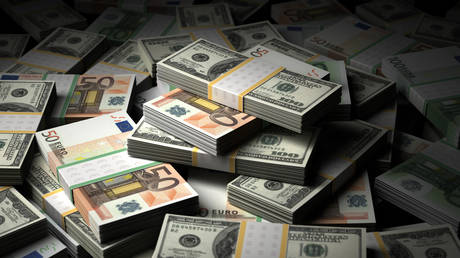
IMF warns West against seizing Russia’s money
The move could undermine the global monetary system, according to the fund’s spokesperson
Western plans to either confiscate Russia’s frozen central bank reserves directly or use the profit they generate could undermine the global monetary system, the IMF has warned.
Western nations, particularly the US, UK and EU states, have blocked an estimated $300 billion in assets belonging to the Russian central bank since the start of the Ukraine conflict in February 2022.
The US and a number of EU nations have advocated confiscating these assets to finance Ukraine’s defense and future reconstruction. However, France, Germany, and several other EU members have resisted those calls, warning that such a move could set a dangerous precedent and adversely affect the euro. Some Western countries proposed to appropriate only the interest accrued on the assets, but that approach is also fraught with legal difficulties.
“It is important for the fund that any actions taken have a sufficient legal basis and do not undermine the functioning of the international monetary system,” IMF spokeswoman Julie Kozack said at a press briefing on Thursday when asked by RIA Novosti about the Western plans for the frozen assets.
Assessing the prospects for reaching an agreement about the Russian funds at the G7 level in light of the group’s upcoming ministerial meeting in Italy, Kozack emphasized that any decisions must be made in the appropriate courts and jurisdictions.
Read more
G20 members lobby EU against seizing Russian assets – FT
The IMF has repeatedly cautioned that Western plans to seize frozen Russian assets could entail unforeseen risks.
The push to seize the money, which has been led by the US, has caused a rift among the G7 and EU political elite. The US, which holds only $6 billion out of the $300 billion in frozen Russian assets, had long been pushing its allies for the outright seizure.
Some Western officials have backed the idea, suggesting transferring the funds to Ukraine, or at least using the interest generated by the assets. However, this approach has faced opposition from the European Central Bank and criticism from the IMF.
While Kiev’s Western backers generally agree that the frozen assets should be used to aid Ukraine, they are at odds about whether an outright seizure would be legal.
Moscow has repeatedly said that seizing its funds would amount to theft and would further undermine global trust in the Western financial system. Russia also warned that it would retaliate if such a step were taken.


